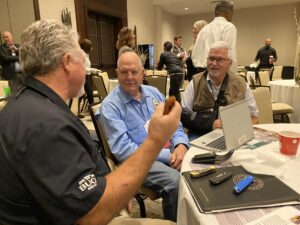An inside look at passing legislation to benefit knife owners
For more than 25 years, the American Knife and Tool Institute has been on the leading edge of pushing for knife law reform at the state and federal levels. The results of that work are impressive. Consider, for instance, that only a handful of states continue to hold on to archaic bans on automatic knives (we see you, Minnesota and New Mexico).

In 2025, we’ve seen Vermont remove its restriction on automatic knife blade lengths, and we’re in the process—hopefully—of getting an automatic knife ban removed in Delaware. Those efforts, fresh in our minds, have helped refine AKTI’s approach to advocating for reasonable knife laws.
With the Vermont win in our rearview mirror, we spoke to two Vermont lawmakers about AKTI’s involvement at the state level. Are we going about it the right way? What can AKTI members do in their home states to advocate for laws that protect knife owners?

“It’s very important that lawmakers be made aware of an issue,” said state Senator Patrick Brennan, who represents part of Chittenden County in northwestern Vermont and who played a key role in getting the blade restriction bill through the legislative process. ” I’m sitting in the Appropriations and Transportation Committees, some big money discussions, and unless I get calls from people like AKTI, it’s really easy for us to drop the ball.”
Brennan, a Republican, was first made aware of Vermont’s restrictions while meeting with C.J. Buck, President of AKTI and CEO of Buck Knives, at a National Assembly of Sportsmen’s Caucuses (NASC) summit more than seven years ago. After introducing legislation a couple of times, he was joined by Representative Dan Noyes, a Democrat and fellow outdoorsman.
“That was important,” Brennan said. “The bill had support on both sides of the aisle and in both chambers. Any time you can build consensus on proposed legislation, it has a better chance of moving through the process.”
That bipartisan support is happening in Delaware, too. Committees in the Delaware Senate and Delaware House have unanimously agreed to proposed legislation that would end the ban on automatic knives, with both Democrats and Republicans casting supporting votes.
 Also key? Having lawmakers’ constituents participate in the process. In Delaware, for instance, Geri Elliot, co-owner of retailer Willey Knives of Greenwood, DE., and an AKTI member, has provided critical testimony on the automatic repeal.
Also key? Having lawmakers’ constituents participate in the process. In Delaware, for instance, Geri Elliot, co-owner of retailer Willey Knives of Greenwood, DE., and an AKTI member, has provided critical testimony on the automatic repeal.
“Having outside groups can help drive the policy discussion, ” said Noyes, a former fishing guide, “but what really resonates is having somebody from my district call me up and advocate for an issue. People need to reach out to their state representatives if they want to see something get through.”
Another needed ingredient? Patience. Despite Brennan and Noyes’ continued support, it took more than five years of collaboration, ongoing discussions with Vermont knife owners, and AKTI’s ongoing advocacy to navigate the legislative process successfully.

“It takes time, and I understand that can be frustrating,” said Noyes, “but you can’t just show up at the last minute and say, ‘Do this for me.'”
Brennan echoed Noyes and took pride in the fact that years of work in the Vermont State House had finally come to fruition.
“It was a long journey,” Brennan said. “I’m glad to have it done. It took us all to keep pushing.”
Editor’s note: AKTI sends a sincere “thank you” to Senator Brennan, Representative Noyes, and the Vermont Legislature for their work on this issue.